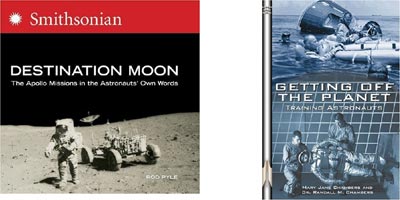Capsule reviews of space historyby Jeff Foust
|
| This publishing niche, though, does present a challenge to new entrants: how to recount this period in an original way? |
The text itself has to fight for space with dozens of photos, black-and-white and color, which dominate some portions of the book. This, plus the somewhat large physical format of the book, almost makes it look like a coffee-table tome, but the text is more substantial than that. The key problem with Destination Moon, though, is that while having even snippets of transcripts might have been novel in the past, today complete transcripts or even video of these missions are available through resources like the Apollo Lunar Surface Journal and DVD producer Spaceflight Films. That makes it difficult for this book to stand out on the bookshelves when so many other basic histories of the Apollo missions have been written.
When the Space Age began, very little was known about how the human body would cope with high accelerations, weightlessness, and the other rigors of spaceflight. Those issues kept a cadre of scientists busy studying these effects on animals, astronauts, and even themselves, including one “experimental psychologist” named Russell Chambers. In Getting Off the Planet, a memoir of sorts by him and his wife, they describe much of the early research that involved centrifuges, underwater simulations of weightlessness, and similar efforts to prepare astronauts to survive their missions.
Getting Off the Planet is an unusual book in that it is written in the first-person voice of Mrs. Chambers, and not her husband, although that voice typically only appears in anecdotes about their life and her meetings with his fellow scientists and astronauts. She explains in the preface that the two adopted this approach because “engineers and scientists tend to tell you more about something than you really want to know!” That’s unfortunate, because while the book is replete with many often-humorous anecdotes, the slender text often glosses over some of the more technical details involving training that may be of interest to many readers. It does, though, offer readers a new and somewhat novel insight into the effort involved with opening the door to space.
